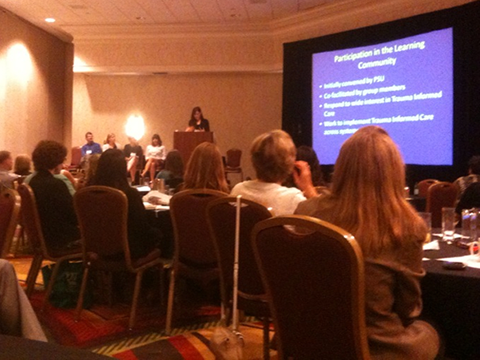Back in November, we told you about an exciting off-shoot of Bridges to Housing. This project is moving forward, and has exciting updates we wanted to share with you.
Bridges to Housing serves high need homeless families throughout the Portland metropolitan area, and has included a substantial evaluation component, conducted by Portland State University’s Regional Research Institute. Their 2009 Year End evaluation report highlighted the impact of trauma on families in the program. Diane Yatchmenoff, Ph.D. and Mandy Davis at the Regional Research Institute identified the impacts of trauma as an area in which they could do additional work in the community, and positively impact the way people are served to address this trauma.
National research indicates that most of us at some point have experienced a traumatic event – the death of a loved one, a car accident, divorce, violence, or other traumatic events. For homeless families or individuals, living on the street or in homeless shelters increases the likelihood of numerous traumatic incidents. Exposure to violence – either on the street or in an intimate relationship, cycles of housing instability, substance abuse and other problems are more prevalent among homeless families, and these events can become cycles of violence and trauma. All too often, the residual impacts of this trauma, which might include an inability to form trusting relationships, to maintain appropriate boundaries and relationships, and seeking to regain power or control, can hinder a person’s ability to interact within our service systems. Families or people seeking services with histories of trauma can often be labeled as paranoid or non-compliant.
Research in the field has led to strategies and program design methods called “trauma informed care.” These methods and strategies seek to understand the trauma families have experienced, and to improve services to help minimize retraumatization experienced by families and help them heal from past trauma.
Diane Yatchmenoff and Mandy Davis have continued this work in new ways: From November 2010 to February 2011, they held a series of informational sessions and focus groups in order to gauge interest, knowledge and status of Trauma Informed Care services and policies in the Portland area. They discovered that there was significant interest in forming an ongoing “Learning Community” in the Portland area that will involve members of various agencies and systems to increase understanding and implementation.
In January 2010, I was selected to participate in the Robert Wood Johnson Foundation’s Ladder to Leadership program. This fellowship selected thirty individuals from the Portland metro area who are working in health or health related fields. As part of the program, we divided into teams and were asked to take on a challenge within the community. My team decided to work on the issue of Trauma Informed Care, and worked closely with PSU to help them with their efforts.

As part of our project, we did research to further define the principles of Trauma Informed Care. We determined these to be the primary seven principles:
- Trauma Awareness: Trauma Informed Services incorporate an understanding of the nature, impact and effects of trauma, recovery from trauma is a primary goal. Recognizes vicarious and secondary trauma.
- Safety: Ensure physical and emotional safety.
- Trustworthiness: Maximize trustworthiness, making tasks clear, and maintaining appropriate boundaries.
- Empowerment: Prioritize consumer empowerment and skill-building.
- Choice: Prioritizing consumer choice and control.
- Collaboration: Maximize collaboration and sharing of power with consumers.
- Inclusiveness: cross cultural effectiveness, competency and sensitivity in working with other cultures and populations.
In addition to doing research into the topic of Trauma Informed Care, we also collected local case studies of agencies implementing Trauma Informed Care or an intentional model that falls under or utilizes those principles. From these, we developed a matrix which describes ways in which Trauma Informed Care is operationalized across organizations. These results will help inform implementation at the agency level and also provide guidance in the systems change process.
Our goal is to further disseminate an understanding of how Trauma Informed Care can create better environment and working conditions for service recipients, agencies and the larger service system. Our team’s project sought to begin a system-based assessment of agency policies, practices and structures in TIC practices. The major components of the project include agency interviews, a matrix of local best practices and involvement into the locally organized Learning Community.
We chose this topic because as a group we felt that this topic was relevant across each one of our agencies regardless of the population served. Our group members work with people in several different settings and include programs addressing the areas of mental health, homelessness and domestic violence. Regardless of the program or population served we all felt that these principles could be utilized in all our agencies as well as benefit the community in several key areas.
Overall, my team and I were excited by the significant amount of work we have accomplished and our on-going work. We believe our project had a positive impact on the on-going work in our community related to trauma informed care, and we look forward to seeing continued progress. Stay tuned here for more as this project progresses in the future. If you’re interested in learning more about Trauma Informed Care, I would suggest starting here. If you provide direct services to people, try this book.
